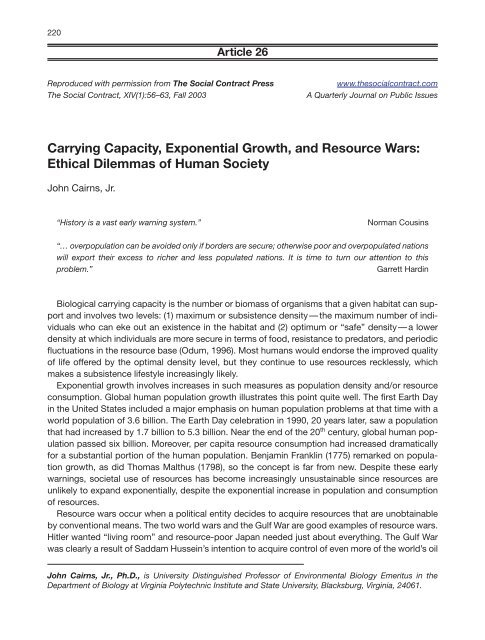220Article 26Reproduced with permission from The Social Contract PressThe Social Contract, XIV(1):56–63, Fall 2003www.thesocialcontract.comA Quarterly Journal on Public IssuesCarrying Capacity, Exponential Growth, and Resource Wars:Ethical Dilemmas of Human SocietyJohn Cairns, Jr.“History is a vast early warning system.”Norman Cousins“… overpopulation can be avoided only if borders are secure; otherwise poor and overpopulated nationswill export their excess to richer and less populated nations. It is time to turn our attention to thisproblem.”Garrett HardinBiological carrying capacity is the number or biomass of organisms that a given habitat can supportand involves two levels: (1) maximum or subsistence density — the maximum number of individualswho can eke out an existence in the habitat and (2) optimum or “safe” density — a lowerdensity at which individuals are more secure in terms of food, resistance to predators, and periodicfluctuations in the resource base (Odum, 1996). Most humans would endorse the improved qualityof life offered by the optimal density level, but they continue to use resources recklessly, whichmakes a subsistence lifestyle increasingly likely.Exponential growth involves increases in such measures as population density and/or resourceconsumption. Global human population growth illustrates this point quite well. The first Earth Dayin the United States included a major emphasis on human population problems at that time with aworld population of 3.6 billion. The Earth Day celebration in 1990, 20 years later, saw a populationthat had increased by 1.7 billion to 5.3 billion. Near the end of the 20 th century, global human populationpassed six billion. Moreover, per capita resource consumption had increased dramaticallyfor a substantial portion of the human population. Benjamin Franklin (1775) remarked on populationgrowth, as did Thomas Malthus (1798), so the concept is far from new. Despite these earlywarnings, societal use of resources has become increasingly unsustainable since resources areunlikely to expand exponentially, despite the exponential increase in population and consumptionof resources.Resource wars occur when a political entity decides to acquire resources that are unobtainableby conventional means. The two world wars and the Gulf War are good examples of resource wars.Hitler wanted “living room” and resource-poor Japan needed just about everything. The Gulf Warwas clearly a result of Saddam Hussein’s intention to acquire control of even more of the world’s oilJohn Cairns, Jr., Ph.D., is University Distinguished Professor of Environmental Biology Emeritus in theDepartment of Biology at Virginia Polytechnic Institute and State University, Blacksburg, Virginia, 24061.
Article 26221reserves. Wars both consume and damage natural and other resources and, thus, lower carryingcapacity and quality of life.THE BASIC ISSUEThe basic issue is: why should an already crowded planet, on which the human population isdestroying natural systems (its ecological life support system) at an unprecedented rate, be eagerto continue exponential growth in both population and per capita resource consumption? Why,when half the world’s population has inadequate food, shelter, education, and medical care, shouldthe countries with the worst problems not receive major assistance to stabilize their populationsuntil all citizens have at least subsistence levels of all four categories? Why should countries withoptimal per capita resources permit immigration rates that will quickly push the countries beyondtheir carrying capacity? Additionally, why should these affluent countries enable poor countries toreduce temporarily the impact of exponential population growth by exporting people? Theseexports are often the most talented people in the poor country and are badly needed to help solveproblems there. Inadequate resources cause resource wars. Why are badly needed resourcesbeing diverted to acquire resources by forceful means instead of using available knowledge todevelop policies and practices appropriate for sustainable use of the planet? Why have we so littleregard for posterity that we encourage the kinds of growth that exacerbate these unsustainableconditions?REVISITING HARDINFor much of my career (spanning more than half a century), I have avoided publishing on populationproblems. After all, Garrett Hardin eloquently discussed all major aspects in Population,Evolution and Birth Control (Hardin, 1969) and a variety of other books, journal articles, and piecesin the popular press. What more could I possibly add? Still, unsustainable practices not only persistbut are worsening, and the prospects for the future of humankind are being seriously, arguablyfatally, jeopardized. Nevertheless, one cannot avoid the personal responsibility for following one’sconscience. As Hardin has remarked in many publications, the global political system is dedicatedto worshiping the unmanaged commons, which is not compatible with sustainable use of theplanet. No matter how many ways humankind finds to express an unpalatable truth, it is impossibleto avoid natural law. It is abundantly clear that billions of people are not adequately fed andhoused, and resources are being depleted at a rate far greater than they are being replenished.Finally, the most important reason for keeping these issues alive is that, when a catastrophedoes occur, there will be the usual responses from the world’s leaders: “why wasn’t I informed?”,“the evidence was primarily junk science, I wanted to wait until the uncertainty was eliminated,” “itwould have had an adverse effect upon economic development,” and the like. The resistance tothese ideas is intensifying. At present, enough evidence has been accumulated to show the fallacyof believing in limitless resources on a finite planet. Ever increasing material wealth for an everincreasing human population is an illusion. Nature enforces limits on other species — technologyand creativity do not exempt humankind from these laws of nature.I have singled out Hardin for this discussion despite the number of other scientists and professionalswho have made significant contributions to the study of the consequences of overpopulation. Hardinhas focused on this problem far more than those of us with other academic interests. Moreover, hekeeps expounding on the message, despite almost overwhelming, discouraging evidence. We mustall remain optimistic that reason will prevail. Even if reason does not prevail, and one or more major cat-















